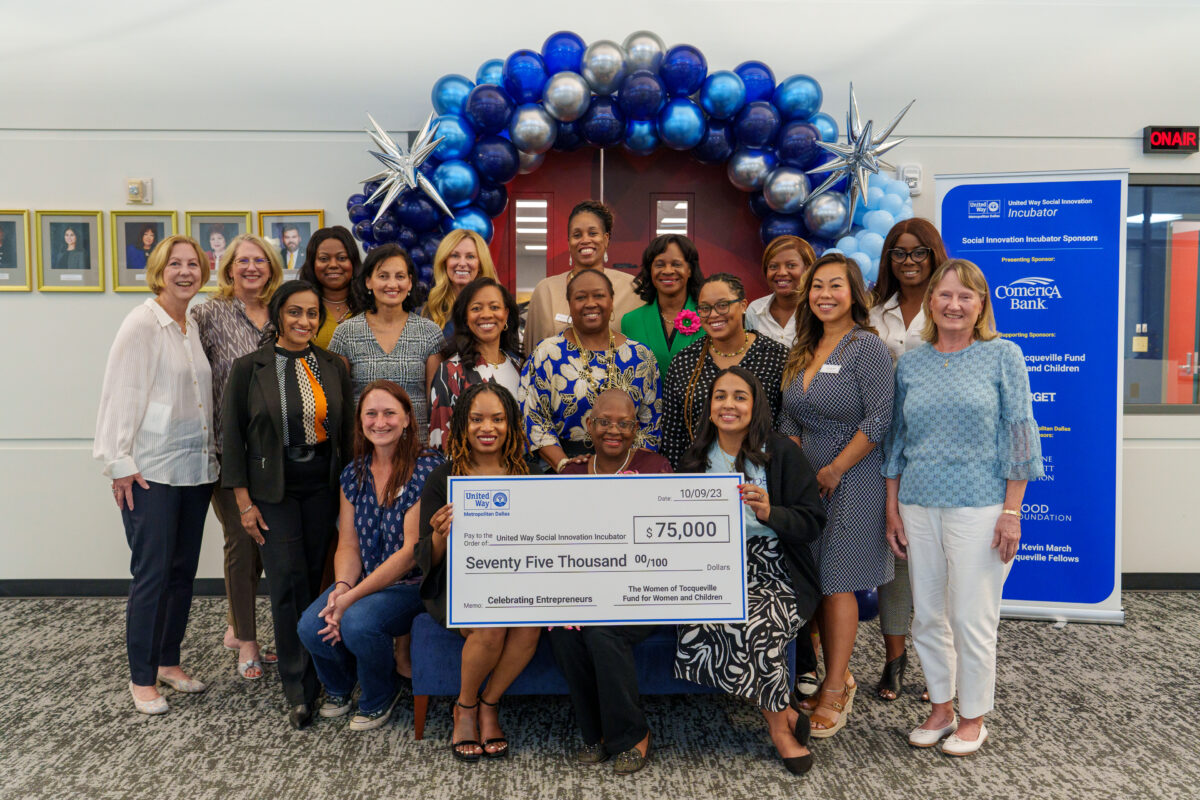Meet our 2023 Social Innovation Incubator Fellows
The 2023 cohort of our Social Innovation Incubator is underway, and we’re excited to introduce you to the nine social entrepreneurs who are participating in this groundbreaking program that provides support and resources as they launch, fine-tune or build their innovative ventures.
Read on to learn more about the Incubator and how it supports our mission to improve access to education, income and health; discover how our partners are creatively advancing this incredible initiative; meet our nine fellows; and learn a bit about how they’re leading changing lives in their communities.
Bringing Greater Equity to Social Innovation
At United Way of Metropolitan Dallas, social innovation is part of everything we do to improve access to education, income and health. Over the past 10 years, we have emerged as a leader in this space, supporting and amplifying the work of a diverse set of social entrepreneurs who are creating measurable impact in North Texas.
To advance our community-wide Aspire United 2030 goals, we approach all our work through a lens of racial equity. Social innovation is one area in which racial equity is particularly important, because not all entrepreneurs who are looking to launch a creative new venture have access to the resources and opportunities necessary to develop a business and secure funding.
To reduce those gaps in resources and opportunity, we created the Social Innovation Incubator, an organizational and leadership development program designed exclusively for early-stage social ventures that are led and staffed by women or people of color. Through our 14-week program, we build up innovative startups while reducing gaps in resources and opportunity.
The Incubator provides participants with mentorship and guidance that empowers them to create a validated business plan and begin building their ventures. The initiative also establishes a stronger, more diverse pipeline of ventures that are ready for the Accelerator program. For example, our second and third Incubator cohorts have been comprised of all women entrepreneurs, and the majority of participants are also people of color.
Collaborating for Greater Impact
The 2023 Social Innovation Incubator will be done in partnership with three talented community partners—Dallas College, Southern Methodist University and eqALL—that support, invest in and provide resources to North Texas social entrepreneurs.
Dallas College delivers full access to an entrepreneurial community with their new Dallas College Venture Club, where each fellow also enjoys a free dedicated workspace. SMU’s MADI Program brings to the Incubator a unique approach to human-centered design, teaching methods and techniques for creative problem solving and business development, while eqALL steers the program’s strategic processes to drive connection and access to resources.
Our list of dedicated Incubator partners also includes Comerica Bank, The Women of Tocqueville Fund for Women and Children, Eugene McDermott Foundation, Target and Charles Schwab, each of which is dedicated to creating lasting change in our community by providing vital investments for programs like the Incubator.
The United Way Women of Tocqueville Fund for Women and Children, which delivers targeted financial and skill-based investments in education, income and health for local women and children. In 2022 and 2023, the fund’s Advisory Council voted to invest in the Incubator, providing entrepreneurs who are women and/or people of color with the funding and resources necessary to build their ventures and grow their impact.
The United Way Women of Tocqueville are also directly involved in the success of each cohort. These dedicated change-seekers volunteer their time to serve as mentors for our Incubator participants, driving further progress toward their goal to improve access to education, income and health for North Texas women and children.
Meet the Entrepreneurs

The 2023 cohort of the Social Innovation Incubator will go through a 14-week learning program in which they will validate their business plan, receive personalized leadership coaching and seed funding, and set their venture up for future success.
This year’s all-women cohort includes nine entrepreneurs with bold visions for improving access to education, income and health in North Texas:
Sydney Portilla-Diggs, Any Step Community Services
Any Step Community Services assists seniors in the Dallas Metroplex by providing nonperishable food. The organization launched the Healthy Steps Recipe Kit Program to distribute simple recipes developed by a nutritionist team, with a goal of educating participants on how to turn food bank items into healthy meals and how to shop for healthier items. Any Step also hosted and launched a Health/Wellness series of workshops and seminars with their partner UT Southwestern, and they are developing an emergency preparedness protocol for older adults.
Cameka Robertson, FASTell Girl
FASTell Girl focuses on holistic health for at-risk girls. Using their BET System, the organization tackles behavior management, offers exposure through mentoring, and provides tutoring for academic and life skills. FASTell empowers girls to manage emotions and behaviors, reduce school-related stress and foster resilience for healthier futures.
Laura Hayes, The Learning Bridge
The Learning Bridge has developed a computer game that teaches college preparedness skills and persistence habits to underrepresented students. By designing, developing and improving on prototypes of their useful gaming system, The Learning Bridge seeks to entice youth to use their gaming time to learn skills and habits that will benefit them in college and beyond.
Monique Brewer, Parent2Parent Café
Parent2Parent Cafe creates community through cafés, meeting monthly to discuss the highs, lows and in-betweens of parenting and providing nonjudgmental care and concern. Additional educational offerings include informational workshops for a variety of everyday needs for parents, including job resources, career mobility, resume writing, self-care, conflict resolution and financial education.
Alicia Serrato, Primos Dallas
Primos is a nonprofit mentoring organization based in Dallas that pairs young students with Latino professionals. Primos’ goal is to foster family-like relationships among mentors and mentees and their families. Their mission is to empower students and their families to tackle any challenge through mentoring and exposure opportunities. In addition to mentoring, Primos also offers workshops, connections to internships and scholarships.
Joanna Lam, Project Beauty
Project Beauty seeks to help their clients break cycles of abuse, rebuild self-esteem and confidence, and improve their health and overall standards of living. They have partnered with local shelters to provide beauty pamper days and beauty bags so clients can access services like haircuts, facials, massages and makeup applications for important life events. They also support children living in shelters as they prepare for school by providing haircuts and other essential self-care services.
Tryrikia Banks, Royalty Health Inc.
Royalty Health Inc. provides healthy living from the inside out by teaching holistic healing, providing mental health resources, assistance with physical needs such as activities of daily living, respite care to help families work while their loved one is taken care of, transportation to medical appointments and assistance with medication. Our goal is to help patients understand that healing comes from within mentally, physically, emotionally and spiritually.
Tamera Jackson, Rootines App
Rootines is a data and analytics platform focused on pediatric complex chronic conditions that seamlessly connects parents to clinicians and care teams. They currently have solutions for NICU follow-up, autism and mental health. The Rootines platform is available on Android, iPhone or through the web via a desktop. It is designed to reach parents and families where they are, which promotes health equity.
Cetarracca Rockwell, Unstudios Technology
Unstudios Technology provides a user-friendly platform where clients and customers who are seeking assistance from social organizations and support programs can complete assessments and receive personalized resource recommendations. The technology seeks to improve access to vital support services and opportunities that can benefit an individual’s life.
Support Social Innovation in North Texas
This is an exciting time to step up and be part of our community’s social innovation movement, especially as we work to make it a more inclusive and equitable environment. We invite you to be a part of the change by supporting the Social Innovation Incubator, which in turn supports innovative organizations that are changing lives in their communities.
Together, we can create opportunity for all North Texans to thrive. Donate today to support our social innovation programs.









